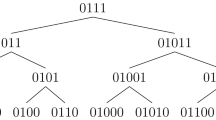Abstract.
In this paper we present a simple parallel sorting algorithm and illustrate its application in general sorting, disk sorting, and hypercube sorting. The algorithm (called the (l,m) -mergesort (LMM)) is an extension of the bitonic and odd—even mergesorts.
Literature on parallel sorting is abundant. Many of the algorithms proposed, though being theoretically important, may not perform satisfactorily in practice owing to large constants in their time bounds. The algorithm presented in this paper has the potential of being practical.
We present an application to the parallel disk sorting problem. The algorithm is asymptotically optimal (assuming that N is a polynomial in M , where N is the number of records to be sorted and M is the internal memory size). The underlying constant is very small. This algorithm performs better than the disk-striped mergesort (DSM) algorithm when the number of disks is large. Our implementation is as simple as that of DSM (requiring no fancy data structures or prefetch techniques.)
As a second application, we prove that we can get a sparse enumeration sort on the hypercube that is simpler than that of the classical algorithm of Nassimi and Sahni [16]. We also show that Leighton's columnsort algorithm is a special case of LMM.
Similar content being viewed by others
Author information
Authors and Affiliations
Additional information
Online publication December 26, 2000.
Rights and permissions
About this article
Cite this article
Rajasekaran, S. A Framework for Simple Sorting Algorithms on Parallel Disk Systems . Theory Comput. Systems 34, 101–114 (2001). https://doi.org/10.1007/s002240010020
Published:
Issue Date:
DOI: https://doi.org/10.1007/s002240010020




